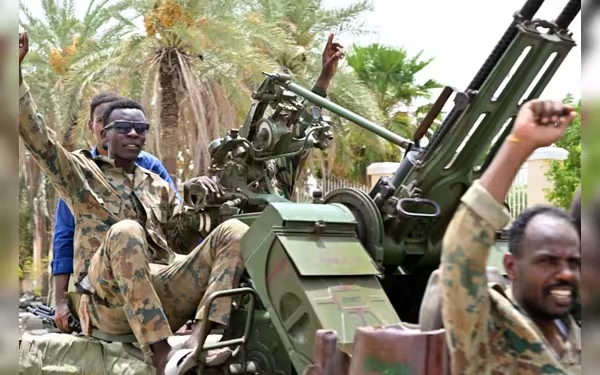Saturday, November 16, 2024 03:18 PM
UN Official Decries Sudan War as One of the Ugliest Humanitarian Crises
- Over 26 million people face acute hunger in Sudan.
- UN reports famine conditions in Zamzam camp.
- Aid workers face harassment while delivering supplies.
 Image Credits: arabnewspk
Image Credits: arabnewspkUN official Laila Baker describes the war in Sudan as one of the ugliest humanitarian crises, with millions facing hunger and displacement.
In recent times, the war in Sudan has escalated into a humanitarian crisis of alarming proportions. With over 26 million people facing acute hunger and millions of women and girls displaced, the situation has drawn the attention of international organizations, including the United Nations. The conflict, which has been ongoing for more than a year, is primarily between two rival factions of the military government: the Sudanese Armed Forces and the paramilitary Rapid Support Forces. This war has not only resulted in a staggering death toll of over 19,000 but has also created the worst displacement crisis in the world, forcing more than 10 million people to flee their homes.
During a recent visit to Sudan, Laila Baker, the Arab States regional director at the UN Population Fund, expressed her deep concern over the dire conditions faced by the people. She described the situation as "one of the ugliest" she has ever witnessed, highlighting the plight of thousands of displaced women living in overcrowded shelters without access to clean water, food, or medical care. Baker's emotional recounting of a 20-year-old woman named Sana, who has suffered in silence after being raped, underscores the severe impact of the conflict on women and girls.
The UN has reported that famine conditions have been confirmed in the Zamzam camp for displaced persons, where children are dying every two hours from malnutrition. This is a stark reminder of the devastating consequences of war on innocent lives. Baker emphasized that the needs in Sudan are far greater than what the international community can currently address, with half of the population now facing famine in a country that was once known as the breadbasket of Africa.
As the conflict continues, aid workers are facing significant challenges, including harassment and attacks, which hinder their ability to deliver essential supplies. The UN has been calling for urgent approvals and security assurances to facilitate humanitarian access, as only one in four medical facilities in the country is still operational. The healthcare system has been severely damaged, leaving many areas unsafe for humanitarian work.
Baker's message to the leaders of the warring factions is clear: "The sooner, the better for everyone involved. Let peace flourish. Let it have a chance." This plea highlights the urgent need for a resolution to the conflict, as the ongoing violence is not only devastating the lives of women and girls but is also driving a stake into the heart of Sudan.
The situation in Sudan serves as a poignant reminder of the human cost of war. As the international community watches, it is crucial to advocate for peace and support humanitarian efforts to alleviate the suffering of those caught in the crossfire. The resilience of the Sudanese people in the face of such adversity is commendable, but without immediate action, the future remains uncertain. It is imperative that we all contribute to the call for peace and support those in need, ensuring that the voices of the vulnerable are heard and addressed.













